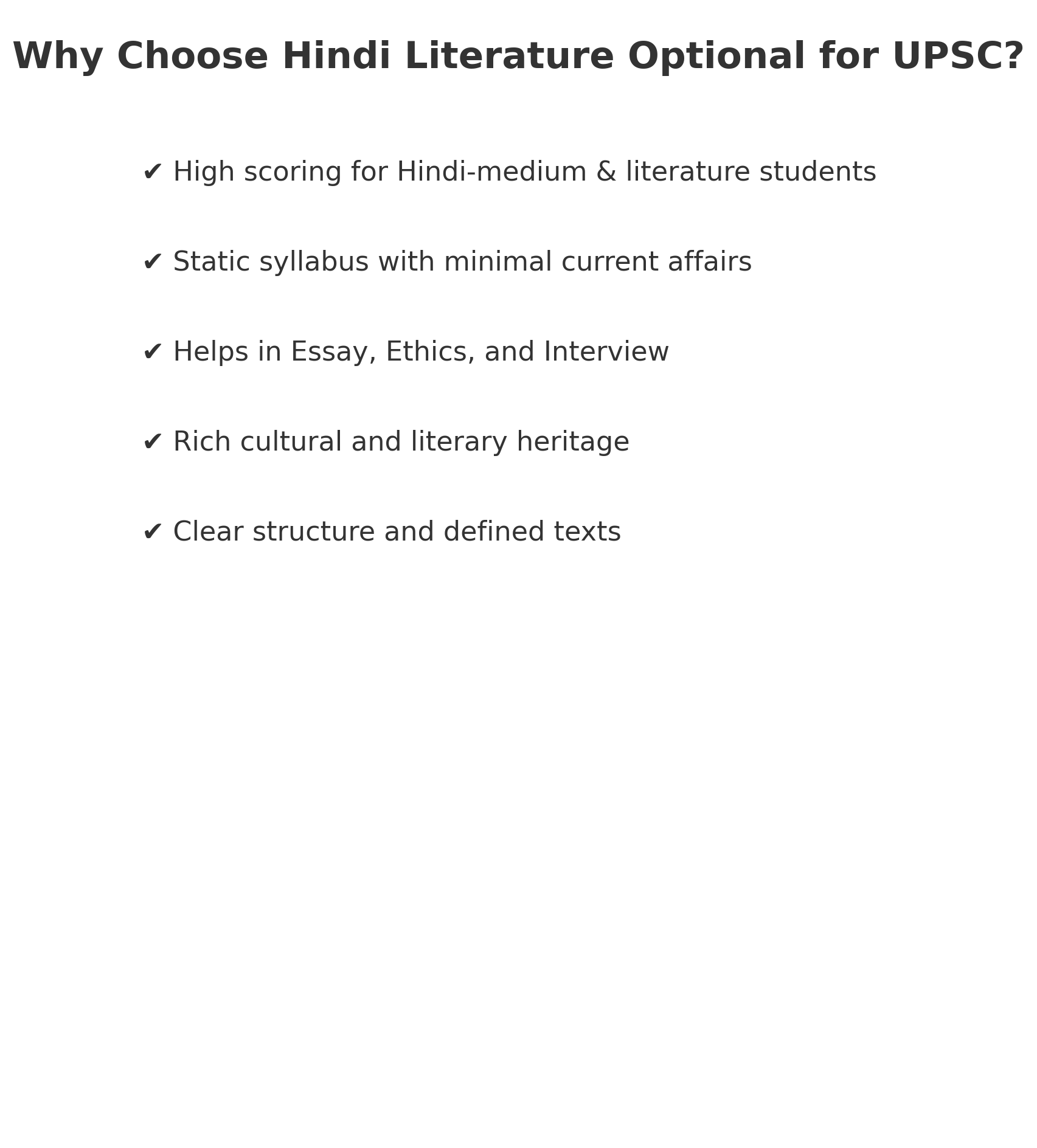
07 Jul UPSC Hindi literature optional
UPSC Hindi Literature Optional – Syllabus, Books, PYQs & Strategy
Why Choose Hindi Literature Optional?
- Scoring optional for students from Hindi-speaking background
- Well-defined and static syllabus
- No current affairs dependency
- Helps in Essay and Ethics with literary references
- Boosts performance in UPSC Mains due to clarity of expression
UPSC Hindi Literature Optional Syllabus
The Hindi Literature Optional has two papers in UPSC Mains – Paper I and Paper II – each of 250 marks. The total marks for the optional subject are 500.
Paper I – History and Criticism
- History of Hindi Language and the Nagari Script
- Grammatical and linguistic characteristics
- Development of Hindi literature through various ages – Ancient, Medieval, Modern
- Major Hindi dialects – Awadhi, Braj, Khari Boli, Bhojpuri
- Major literary trends, movements, and their key figures
Paper II – Prescribed Texts
This paper tests analytical, critical, and literary skills based on the following genres:
- Poetry: Kabir, Surdas, Tulsidas, Nirala, Maithili Sharan Gupt
- Prose: Premchand, Phanishwar Nath Renu, Jayshankar Prasad, Harishankar Parsai
- Novels, Drama, Short Stories, and Literary Criticism
Download UPSC Hindi Literature Optional Syllabus PDF:
Best Books for UPSC Hindi Literature Optional
Paper I (Language and Literary History)
- Hindi Bhasha ka Itihas – Dr. Hardev Bahri
- Hindi Sahitya ka Itihas – Ramchandra Shukla / Dr. Nagendra
- Bhasha Vigyan aur Hindi Bhasha – Dr. Ramesh Chandra
Paper II (Textual Analysis)
- Kabir Granthavali – Dr. Hazari Prasad Dwivedi
- Ramcharitmanas – Goswami Tulsidas
- Premchand Ki Kahaniyan – Munshi Premchand
- Rashmirathi – Ramdhari Singh Dinkar
- Godaan – Premchand
- Maila Aanchal – Phanishwar Nath Renu
Refer to NCERT Hindi textbooks for better foundational clarity and language style understanding.
UPSC Hindi Literature Optional Previous Year Questions (PYQ)
Practicing PYQs is essential to grasp the nature of the questions asked and to improve answer presentation. Here’s how to use them:
- Identify high-frequency topics (e.g., Kabir, Premchand, Nirala)
- Write answers and get them reviewed by mentors or toppers
- Organize PYQs topic-wise and cross-reference with the syllabus
- Use literary terms and frameworks in your answers
Consistent answer writing practice using PYQs ensures confidence and improves marks in the Mains exam.
How to Prepare for Hindi Literature Optional
- Start with Paper I: Cover language, grammar, and history first. Make notes in bullet form.
- Master Prescribed Texts: Read the texts multiple times. Highlight literary elements, metaphors, imagery, and historical context.
- Write answers regularly: Especially long answer formats (10/15/20 markers)
- Use quotations and couplets: Enhance your answer quality with references from the texts
- Revise frequently: Revise author bios, themes, movements, and grammar rules
- Join a test series: Evaluation helps in understanding answer structure, expression, and accuracy
Topper Tips for Hindi Literature Optional
“Answer writing is the key in Hindi Literature. Don’t just summarize – interpret.” – AIR 67
“Hindi texts need to be read deeply. Understanding the social and cultural backdrop improves your analysis.” – AIR 114
“Use a good balance of storytelling and structure in your answers. It’s literature – make it beautiful!” – AIR 88
Common Mistakes to Avoid
- Neglecting Paper I (language & history) due to overconfidence
- Writing generic answers without literary critique
- Ignoring quotations and literary references
- Underestimating the importance of revision and PYQ practice
Should You Take Hindi Literature Optional?
If you’re from a Hindi medium background, love Hindi poetry or fiction, or have studied literature at the graduation or post-graduation level, this subject can be very scoring for you. Even if you haven’t studied it academically, but are a passionate reader with good writing skills, you can master Hindi Literature Optional with 6–8 months of dedicated preparation.
Conclusion
UPSC Hindi Literature Optional offers a rich intellectual journey and a strong chance of scoring 270+ marks with consistent writing and reading. With structured preparation, a curated booklist, and practice of PYQs, you can master this optional and turn it into your strongest asset in the UPSC Mains.
Download the official syllabus in PDF format:




No Comments